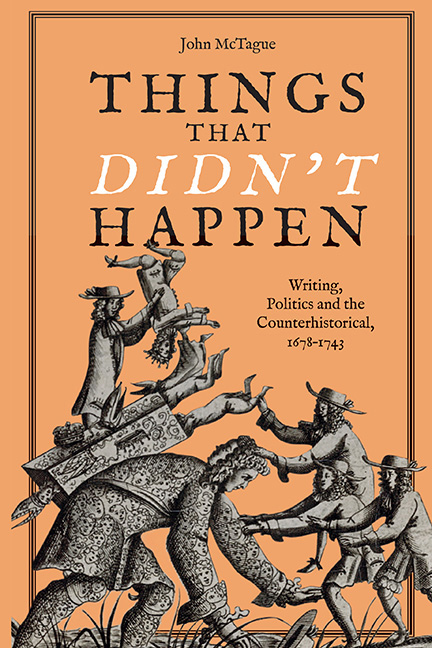Conclusion: Events that Didn't Happen
Published online by Cambridge University Press: 09 October 2019
Summary
In another sense, for Pope, the Dunciads are full to bursting with things that did happen, but shouldn't have – the preferment of Ambrose Philips, for instance – and so he works to create a world in which these happenings do not qualify as events. As I have argued, this is not the world in which he and the rest of the Scriblerians live, but a counterhistory. The Dunciads, like other Scriblerian satires, and perhaps especially Swift's A Tale of a Tub, narrate changes in what Sewell thinks of as ‘structures’, and some of the events that brought those changes about: the professionalisation of writing of all kinds; the commercial opportunities brought about by print; the religious and social and political transformations proceeding from the crises of the seventeenth century. However, even as they narrate the apotheosis of Dulness – a cultural apocalypse – the Dunciads pretend that these events have not changed structures. That pretence is an attempt to preserve structures of a different kind, and it was and has been an enabling and effective one. Few people have written on the Dunciads without acknowledging the lasting effect they have had on literary and cultural history, as the politically and culturally marginal Scriblerians emerge as the victors from a conflict with the supposedly middlebrow mainstream, the account of which conflict has been transmitted to posterity chiefly through their own writings. One way of accounting for this influence is thinking of the Dunciads as historiography of a certain kind: a kind that indulges in what Sewell thinks of as the rhetorical suppression of the eventful. Sewell says that Immanuel Wallerstein's account of the rise of global capitalism ‘contains some astute eventful analysis of the political and economic history of Europe in his period, although his rhetoric suppresses the narrative's eventful qualities’. Sewell is suggesting Wallerstein produces an ‘eventful’ narrative unawares: the eventfulness emerges ‘all by itself’, a necessary if not inevitable consequence of the material he is dealing with and the explanations he is trying to make. His point is that Wallerstein does not consciously think he is working with an eventful temporality, and so those qualities are suppressed.
- Type
- Chapter
- Information
- Things that Didn't HappenWriting, Politics and the Counterhistorical, 1678–1743, pp. 249 - 256Publisher: Boydell & BrewerPrint publication year: 2019



